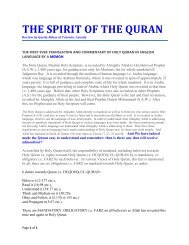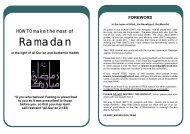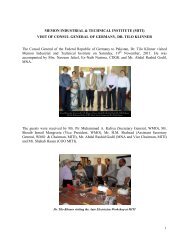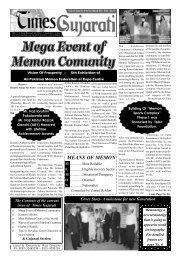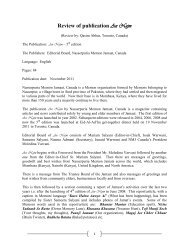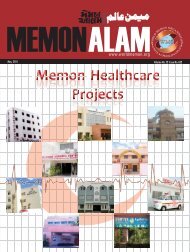August 2011 Final Pages.indd - World Memon Organization ...
August 2011 Final Pages.indd - World Memon Organization ...
August 2011 Final Pages.indd - World Memon Organization ...
Create successful ePaper yourself
Turn your PDF publications into a flip-book with our unique Google optimized e-Paper software.
HEALTH MATTERS<br />
5 Foods That Can<br />
Trigger a Stroke<br />
Few things feel more terrifying and<br />
random than a stroke, which can strike<br />
without warning. And fear of stroke --<br />
when a blood vessel in or leading to the brain<br />
bursts or is blocked by a blood clot, starving<br />
brain cells of oxygen and nutrients -- is well<br />
founded. After all, stroke is the number-three<br />
killer in the U.S., affecting more than 700,000<br />
people each year. Here are five foods that<br />
cause the damage that leads to stroke.<br />
1. Crackers, chips, and<br />
store-bought pastries and<br />
baked goods<br />
brain) than women who ate just 1 gram a day.<br />
Another recent study, also in women, found<br />
that trans fats promoted inflammation and<br />
higher levels of C-reactive protein, which have<br />
been linked to an increased risk of diabetes,<br />
heart disease, and stroke.<br />
What to do<br />
Aim to limit trans fats to no more than 1 or<br />
2 grams a day -- and preferably none. Avoid<br />
fast-food French fries and other fried menu<br />
items and study packaged food labels closely.<br />
Even better, bake your own cookies, cakes,<br />
and other snacks. When you can’t, search out<br />
“health-food” alternative snacks, such as Terra<br />
brand potato chips and traditional whole grain<br />
crackers such as those made by Finn, Wasa,<br />
AkMak, Ryvita, and Lavasch.<br />
2. Smoked and processed<br />
meats<br />
salami fans; cancer journals have reported<br />
numerous studies in the past few years showing<br />
that consumption of cured and smoked<br />
meats is linked with increased risk of diabetes<br />
and higher incidences of numerous types of<br />
cancer, including leukemia.<br />
What to do<br />
If a smoked turkey or ham sandwich is your<br />
lunch of choice, try to vary your diet, switching<br />
to tuna, peanut butter, or other choices<br />
several days a week. Or cook turkey and<br />
chicken yourself and slice it thin for sandwiches.<br />
3. Diet soda<br />
Muffins, doughnuts, chips, crackers, and<br />
many other baked goods are high in trans fats,<br />
which are hydrogenated oils popular with<br />
commercial bakeries because they stay solid<br />
at room temperature, so the products don’t<br />
require refrigeration. Also listed on labels as<br />
“partially hydrogenated” or hydrogenated oils,<br />
trans fats are found in all kinds of snack foods,<br />
frozen foods, and baked goods, including<br />
salad dressings, microwave popcorn, stuffing<br />
mixes, frozen tater tots and French fries, cake<br />
mixes, and whipped toppings. They’re also<br />
what makes margarine stay in a solid cube.<br />
The worst offenders are fried fast foods such<br />
as onion rings, French fries, and fried chicken.<br />
Why it’s bad<br />
For years scientists have known trans fats are<br />
dangerous artery-blockers, upping the concentrations<br />
of lipids and bad cholesterol in the<br />
blood and lowering good cholesterol. Now we<br />
can add stroke to the list of dangers. This year<br />
researchers at the University of North Carolina<br />
found that women who ate 7 grams of<br />
trans fat each day -- about the amount in two<br />
doughnuts or half a serving of French fries<br />
-- had 30 percent more strokes (the ischemic<br />
type, caused by blocked blood flow to the<br />
34<br />
Whether your weakness is pastrami, bacon, or<br />
a smoked turkey sandwich, the word from the<br />
experts is: Watch out.<br />
Why it’s bad<br />
Smoked and processed meats are nasty<br />
contributors to stroke risk in two ways: The<br />
preserving processes leave them packed with<br />
sodium, but even worse are the preservatives<br />
used to keep processed meats from going bad.<br />
Sodium nitrate and nitrite have been shown<br />
by researchers to directly damage blood vessels,<br />
causing arteries to harden and narrow.<br />
And of course damaged, overly narrow blood<br />
vessels are exactly what you don’t want if you<br />
fear stroke.<br />
Many studies have linked processed meats<br />
to coronary artery disease (CAD); one metaanalysis<br />
in the journal Circulation calculated a<br />
42-percent increase in coronary heart disease<br />
for those who eat one serving of processed<br />
meat a day. Stroke is not the only concern for<br />
Although replacing sugary drinks with diet<br />
soda seems like a smart solution for keeping<br />
weight down -- a heart-healthy goal -- it turns<br />
out diet soda is likely a major bad guy when it<br />
comes to stroke.<br />
Why it’s bad<br />
People who drink a diet soda a day may up<br />
their stroke risk by 48 percent. A Columbia<br />
University study presented at the American<br />
Stroke Association’s <strong>2011</strong> International Stroke<br />
Conference followed 2,500 people ages 40 and<br />
older and found that daily diet soda drinkers<br />
had 60 percent more strokes, heart attacks,<br />
and coronary artery disease than those who<br />
didn’t drink diet soda. Researchers don’t know<br />
exactly how diet soda ups stroke risk -- and<br />
are following up with further studies -- but<br />
nutritionists are cautioning anyone concerned<br />
about stroke to cut out diet soda pop.<br />
What to do<br />
Substitute more water for soda in your daily<br />
diet. It’s the healthiest thirst-quencher by far,<br />
researchers say. If you don’t like water, try<br />
lemonade, iced tea, or juice.<br />
4. Red meat<br />
This winter, when the respected journal<br />
Stroke published a study showing that women<br />
MEMON ALAM AUGUST <strong>2011</strong>



